Iraqi Prime Minister Mohammed Shia al-Sudani expelled the Swedish ambassador on Wednesday, even as a mob of protesters waving photos of Shiite cleric Moqtada al-Sadr stormed the Swedish embassy in Baghdad and set it on fire.
The attack was a preemptive strike against a scheduled burning of the Quran in Stockholm by Salwan Momika, the same Iraqi refugee who burned a Quran last month.
Hundreds of protesters overran the Swedish embassy compound in Baghdad early on Thursday morning, occupying it for several hours and setting fires. It was the second assault on the Swedish embassy since the Quran-burning controversy began.
The fires were brought under control and the occupying force eventually departed on its own. Swedish diplomats said the embassy would be closed to visitors indefinitely after the attack.
Iraqi Prime Minister Sudani released a statement later on Thursday saying the vandals would be prosecuted and blaming “negligent security officials” for allowing the assault on the embassy, which was a severe violation of diplomatic protocol and international law.
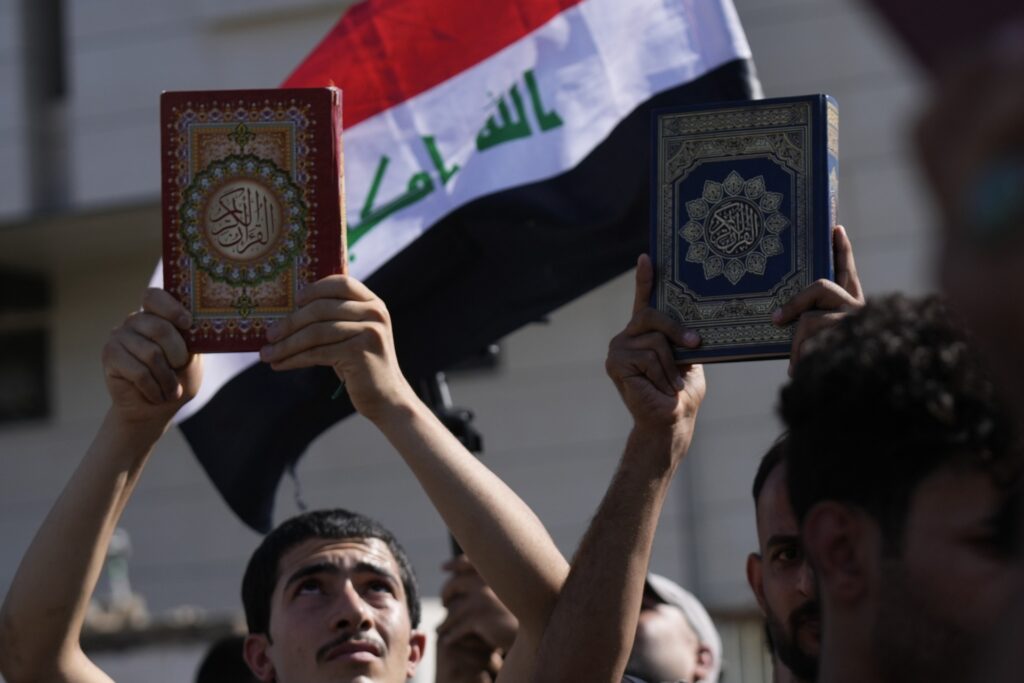
Supporters of the Shiite cleric Muqtada al-Sadr raise the Quran, the Muslims’ holy book, during a demonstration in front of the Swedish Embassy in Baghdad, on June 30, 2023. (AP Photo/Hadi Mizban)
However, Sudani also said the Swedish ambassador to Iraq has been asked to leave, Iraq has recalled its charge d’affaires from Sweden, and the Iraqi government has halted business with Swedish companies. The Iraqi Media and Communications Commission said on Thursday that it has suspended Swedish communications giant Ericsson’s license to operate in Iraq.
Sudani said these actions were “prompted by the Swedish government’s repeated permission for the burning of the holy Quran, insulting Islamic sanctities, and the burning of the Iraqi flag.” He further threatened to cut all diplomatic ties with Sweden if there is “any recurrence of the incident involving the burning of the holy Quran on Swedish soil.”
Ericsson responded to the loss of its license in Iraq by insisting it had nothing to do with the Quran-burning and did not approve of the act, as the company found it “deeply offensive to the religious beliefs and values cherished by Muslims around the world.”
Swedish Foreign Minister said on Thursday the assault on his country’s embassy in Baghdad was “unacceptable.”
“Iraqi authorities have an unequivocal obligation to protect diplomatic missions and diplomatic staff in accordance with the Vienna Convention. It is clear that the Iraqi authorities have failed to fulfill this obligation,” Billstrom said.
“Fortunately, the staff at the Swedish Embassy were able to move to safety. The Government is now reviewing what further measures need to be taken,” he said.
Finland’s ambassador to Iraq said on Wednesday that his country’s embassy has also been evacuated.
The assault in Baghdad, and other demonstrations at Swedish embassies around the world, was in response to news that Swedish officials gave Salwan Momika permission to burn a second Quran.
Momika, a 37-year-old Iraqi asylum seeker of Christian origins who now claims to be an atheist, was given a permit by Swedish authorities on June 29 to conduct a demonstration outside a Stockholm mosque during which he played the Swedish national anthem, waved a Swedish flag, and burned a Quran after wrapping some of its torn pages around strips of bacon, a food prohibited in Islam.
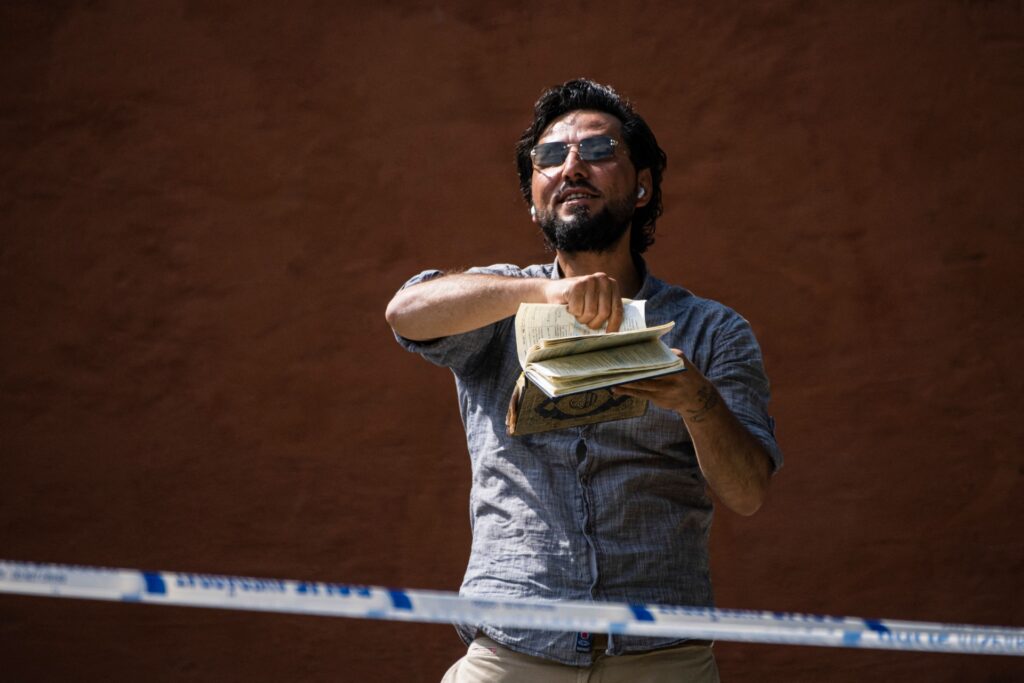
Salwan Momika protests outside a mosque in Stockholm on June 28, 2023, during the Eid al-Adha holiday. (JONATHAN NACKSTRAND/AFP via Getty Images)
Momika’s demonstration was met by angry protests in various Muslim nations and demands to curtail Western free speech protections in favor of Islamic blasphemy laws. In early July, the 57-member Organization of Islamic Cooperation (OIC) demanded international laws that would make burning the Quran illegal around the world.
Turkey, which has long obstructed Sweden’s bid to join NATO for other reasons, threatened to block Sweden’s membership indefinitely because “those who seek to become our allies in NATO cannot tolerate or enable destructive behaviors of Islamophobic and xenophobic terrorists,” as a spokesman for President Recep Tayyip Erdogan put it.
Sweden insisted that its free speech protections covered Momika’s actions and granted him a permit to hold another demonstration on Thursday. Momika and another man proceeded to hold a protest against Islam on a lawn in Stockholm about 300 feet from the Iraqi embassy during which they stomped and kicked a copy of the Quran, but did not set it on fire.
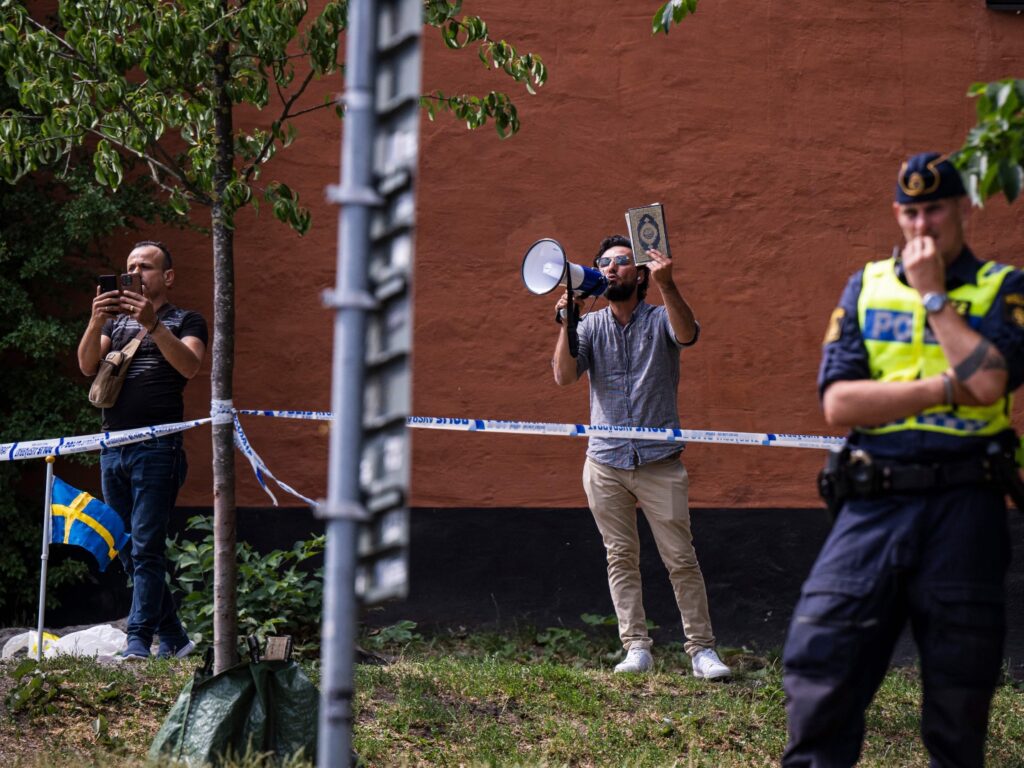
Salwan Momika protests outside a mosque in Stockholm on June 28, 2023, during the Eid al-Adha holiday. (JONATHAN NACKSTRAND/AFP via Getty Images)
The demonstrators also kicked around an Iraqi flag, photos of Moqtada al-Sadr, and photos of Iranian Ayatollah Ali Khamenei. A small crowd of counter-protesters watched from behind police barricades.
“The constitution states that a lot is needed to deny a person a permit for a public gathering so the day before yesterday we granted a permit for a private individual to protest,” Stockholm police officer Ola Osterling explained.
“Granting permission under the pretext of freedom of expression is viewed as provocative and contrary to international covenants and norms, which emphasize respect for religions and beliefs,” responded the Iraqi prime minister’s office.
Moqtada al-Sadr weighed in on Thursday, exhorting the government in Baghdad to take even stronger action.
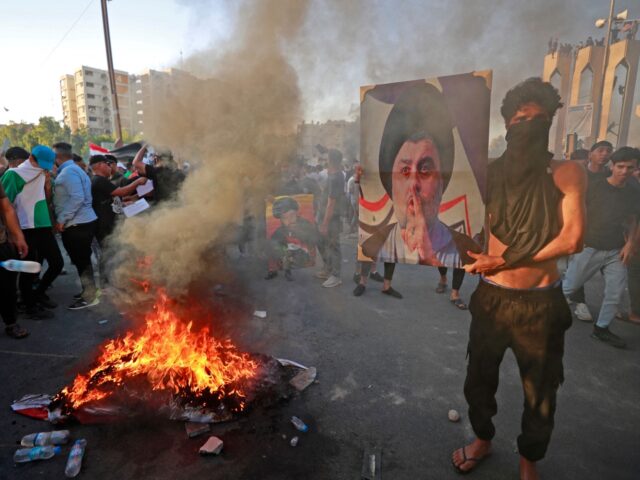
Supporters of Iraq’s Sadrist movement gather outside the Swedish embassy in Baghdad on June 30, 2023. (AHMAD AL-RUBAYE/AFP via Getty Images)
“Sweden’s hostility towards Islam and the holy books by giving permission to burn the Iraqi flag means Sweden doesn’t believe in Iraq,” he said.
“It’s on the government to not just express condemnation and denunciation, as that shows weakness and complacency,” he insisted.
The U.S. State Department “strongly condemned the attack on the Swedish embassy in Baghdad,” as did the European Union.
“It is unacceptable that Iraqi Security Forces did not act to prevent protestors from breaching the Swedish Embassy compound for a second time and damaging it,” the State Department said on Thursday.
“We call on the Government of Iraq to honor its international obligations to protect all diplomatic missions in Iraq against any intrusion or damage, as required by international law,” the State Department insisted.
“We look forward to the swift adoption of the necessary security measures by the Iraqi authorities to prevent further incidents and to hold the perpetrators of this attack accountable, as announced by the Iraqi Government,” the EU said.
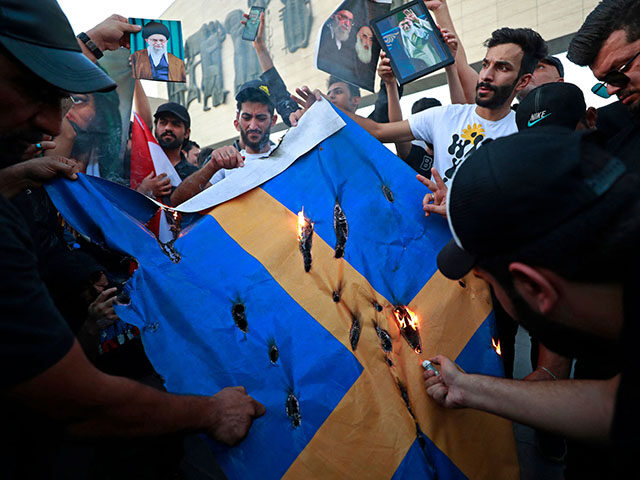

COMMENTS
Please let us know if you're having issues with commenting.